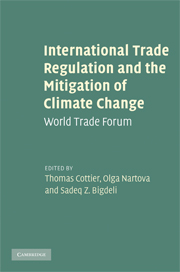Book contents
- Frontmatter
- Contents
- Contributors
- List of figures
- List of tables
- List of abbreviations
- Preface
- PART I Climate change mitigation: scientific, political and international and trade law perspectives
- PART II Climate change mitigation and trade in goods
- PART III Trade in renewable energy sources
- PART IV Climate change mitigation and trade in services
- PART V Climate change and technology transfer, investment and government procurement: legal issues
- 14 International transfer of technologies: recent developments in the climate change context
- 15 TRIMS and the Clean Development Mechanism — potential conflicts
- 16 Balancing investors' interests and global policy objectives in a carbon constrained world: the interface of international economic law with the Clean Development Mechanism
- 17 Procurement policies, Kyoto compliance and the WTO Agreement on Government Procurement: the case of the EU green electricity procurement and the PPMs debate
- 18 Procurement and the World Trade Organization: purchase power or pester power?
- PART VI Institutional challenges and the way forward
- Index
17 - Procurement policies, Kyoto compliance and the WTO Agreement on Government Procurement: the case of the EU green electricity procurement and the PPMs debate
from PART V - Climate change and technology transfer, investment and government procurement: legal issues
Published online by Cambridge University Press: 04 August 2010
- Frontmatter
- Contents
- Contributors
- List of figures
- List of tables
- List of abbreviations
- Preface
- PART I Climate change mitigation: scientific, political and international and trade law perspectives
- PART II Climate change mitigation and trade in goods
- PART III Trade in renewable energy sources
- PART IV Climate change mitigation and trade in services
- PART V Climate change and technology transfer, investment and government procurement: legal issues
- 14 International transfer of technologies: recent developments in the climate change context
- 15 TRIMS and the Clean Development Mechanism — potential conflicts
- 16 Balancing investors' interests and global policy objectives in a carbon constrained world: the interface of international economic law with the Clean Development Mechanism
- 17 Procurement policies, Kyoto compliance and the WTO Agreement on Government Procurement: the case of the EU green electricity procurement and the PPMs debate
- 18 Procurement and the World Trade Organization: purchase power or pester power?
- PART VI Institutional challenges and the way forward
- Index
Summary
Introduction
Public procurement is considered a potent policy tool to address numerous other secondary governmental policies including climate change and energy security concerns. This is more so with the European Union (EU) among other parties to the Kyoto Protocol that have made binding commitments to reduce greenhouse gas (GHG) emissions. This is sought to be achieved through the ‘greening’ of public procurement by which procuring authorities give preference to products, services or suppliers that are more environment friendly and net energy efficient than others. The climate change benefit of green procurement has been underscored by a study called ‘Relief’ conducted between 2001 and 2003 for the European Commission, which shows, for instance, that ‘if all public bodies in the EU switched to green electricity, they would avoid more than sixty million tonnes of CO2 emissions per year, thus contributing towards 18 per cent of the EU's Kyoto target’. Previously, the EU had aimed to have renewable energy sources providing 21 per cent of electricity by 2010.
Public procurement is regulated by the World Trade Organization (WTO) Agreement on Government Procurement (GPA) 1994. The GPA is a plurilateral agreement binding only the WTO Members that specifically subscribe to it. The EU green procurement policy is informed by the objectives of the EU climate change mitigation and energy security policies. This policy is provided for in the new Public Procurement Directives.
- Type
- Chapter
- Information
- International Trade Regulation and the Mitigation of Climate ChangeWorld Trade Forum, pp. 328 - 350Publisher: Cambridge University PressPrint publication year: 2009

